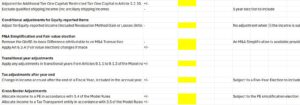Overview
On October 6, 2022, the OECD issued a report on Tax Incentives and the Global Minimum Corporate Tax: Reconsidering Tax Incentives after the GloBE Rules (the ‘Report’).
It looks at the impact of tax incentives on the global minimum tax under
Pillar Two, and in particular the approach that jurisdictions should be taking when considering which tax incentives to offer, given
top-up tax under Pillar Two could negate any benefit the jurisdiction gains from granting certain tax incentives.
The jurisdiction then effectively loses out twice as it needs to administer the tax incentive that is ineffective, and it also loses out on the tax revenue.
As such reassessing tax incentives is an important consideration for jurisdictions going forward.
However, given there isn’t a simple ‘one size fits all approach’ the OECD acknowledges that this will take time. An interim measure to protect the local tax base is to enact a
qualifying domestic minimum tax. This then at least allows the jurisdiction to collect the top-tax revenue rather than it being collected by a foreign jurisdiction. This also allows time to consider how to amend the tax system to deal with any ineffective tax incentive regimes.
An interesting observation in Paragraph 85 of the
Report is that jurisdictions should balance the administrative costs of implementing a qualifying domestic minimum tax against any revenue gains. If a jurisdiction is unlikely to see MNE’s subject to top-up tax in that jurisdiction they may wish to delay implementing the Pillar Two GloBE Rules given there is no benefit.
Jurisdictional Blending
Jurisdictional blending under Pillar Two will have an impact on the extent to which tax incentives will lead to a top-up tax liability.
Therefore, an MNE with entities in a jurisdiction some of which have ETRs above and below 15% would blend the results when determining the jurisdictional ETR and whether any top-up tax is due.
This means that tax incentives that are broad-based are likely to have a more significant impact on an MNEs jurisdictional ETR as opposed to tax incentives targeted at limited activities or income.
A reduced rate of corporate income tax or a tax holiday for instance would impact the jurisdictional ETR much more than a patent box that applied to IP income.
Jurisdictional blending means that where provisions targeting the taxable base are relatively narrow, low-tax income will be blended with other higher-taxed income of the entity limiting the overall effect on the ETR.
Therefore, the overall effective level of taxation in a jurisdiction will be affected by how widespread base narrowing provisions are. A wide scope for tax incentives could lead to low ETRs even where the statutory tax rate is relatively high.
Another important factor is whether multiple tax incentives can be used. If they can this could result in low jurisdictional ETRs.
Bonus Depreciation and other Timing Differences
Enhanced tax allowances including allowing a 100% tax deduction for capital assets will generally not impact on the GloBE ETR and they are therefore an effective tax incentive. This assumes that there is no Pillar Two
deferred tax recapture.
The foundation of the Pillar Two GloBE ETR calculation is the entities financial accounts. This means that any reductions to the local tax base due to tax exemptions or additional deductions will not affect GloBE Income as they don’t impact on financial accounting income. However, they will impact on the tax figure in the financial accounts. Given that these incentives will not affect financial accounting income but will affect taxes paid, they may reduce the GloBE ETR.
This would be the case for bonus depreciation for instance if the GloBE rules did not take into account deferred tax. However, the GloBE rules include
deferred tax in adjusted covered taxes, which largely negates the impact on the ETR.
The GloBE
deferred tax recapture rule should also be considered. Deferred tax liabilities that aren’t paid within 5 years are clawed back.
This means that for tax incentives that create timing differences that last for more than 5 years on assets that aren’t tangible assets (or other qualifying assets) there would be an impact on the GloBE ETR.
In the case of accelerated depreciation for instance, the tax incentive may lead to top-up tax in the earlier years where the accelerated depreciation provisions decrease the tax base to a greater extent. This decrease in taxation is not compensated in later years where tax payments increase.
Deferred tax liabilities on tangible assets are excluded from the deferred tax recapture rules. As such, any tax incentives that result in temporary differences and which are targeted to the cost recovery of tangible assets are unaffected by the GloBE Rules.
Substance-Based Income Exclusion
Article 5.3.2 of the
OECD Model Rules provides that the substance-based income exclusion amount is based on the total of the payroll carve-out and the tangible asset carve-out for each constituent entity in a jurisdiction (excluding investment entities). This is based on the assumption that tangible assets and payroll are a good indicator of genuine economic activities.
Article 5.3.3 of the
OECD Model Rules provides that the payroll carve-out is equal to 5% of the constituent entities’ eligible payroll costs of eligible employees that perform activities for the MNE Group whilst under Article 5.3.4 of the
OECD Model Rules the tangible asset carve-out is equal to 5% of the carrying value of eligible tangible assets of a constituent entity located in a jurisdiction.
The substance-based income exclusion feeds directly into the top-up tax calculation as it reduces excess profits which are then used to calculate the initial top-up tax.
This means that MNEs with a higher amount of substance in a jurisdiction will be less affected than others, as they will benefit from the substance-based income exclusion and will face a smaller increase in top-up tax under the GloBE Rules.
Entities operating in capital intensive industries carrying-out activities that require high levels of economic substance in a jurisdiction will see less of an impact under the GloBE Rules. This equally applies to jurisdictions that typically have high levels of economic substance (ie the jurisdiction will be impacted less by the GloBE Rules).
The corollary to this is that tax incentives that are linked to the amount of economic substance will also see less of an impact under the GloBE Rules.
An impact of the GloBE Rules is that the substance-based income exclusion will have more of a beneficial impact on expenditure-based tax incentives as opposed to income-based tax incentives. This is because expenditure-based tax incentives are more likely to promote investment in tangible assets and payroll in a jurisdiction which then leads to a larger substance-based income exclusion.
Therefore, jurisdictions whose tax incentives favour expenditure-based incentives are likely to be impacted less by the GloBE Rules (other things being equal).
Tax Credits
The impact of tax incentives under the GloBE rules depends on whether they:
- reduce covered tax
- increase GloBE Income; or
- are adjusted to ensure a neutral effect on the GloBE ETR.
Tax incentives have the biggest impact on the GloBE ETR where they reduce covered taxes.
Most tax credits would fall into this category and therefore could have a significant impact on the GloBE ETR leading to top-up tax for an MNE.
However,
Qualified Refundable Tax Credits are treated as income for Pillar Two GloBE purposes, as opposed to being reflected as a reduction in adjusted covered taxes. If this accords with the financial accounting treatment no adjustment is required. If the financial accounting treatment reflects these tax credits in the tax expense a GloBE adjustment is required.
Under Article 10 of the
OECD Model Rules, a Qualified Refundable Tax Credit is a refundable tax credit paid as cash or available as cash equivalents within four years. A common example of this could be an R&D refundable tax credit.
The OECD Report does however warn against simply changing a tax credit to fit the definition of a qualifying refundable tax credit as although this may lessen the impact of the GloBE Rules on the incentive, it could also lead to substantial revenue losses.
Jurisdictional Factors
The general corporate income tax regime in a jurisdiction will have a significant impact on the impact of the GloBE Rules for that jurisdiction.
Jurisdictions with low statutory tax rates or where there are significant tax incentives that substantially narrow the taxable base will feel the most impact of the GloBE Rules. See our
Global Map of Headline CIT Rates which highlights countries with low statutory rates.
It’s worthwhile noting that low-tax jurisdictions where MNE’s are subject to tax under CFC rules in another jurisdiction will see a lower increase in tax under the GloBE rules as tax paid on the CFC income is allocated to the CFC, thus increasing its ETR and reducing any top-up tax (subject to the
CFC pushdown limitation).
Policy Options
Tax incentives are still an effective option to encourage inward investment, but the introduction of the GloBE Rules adds another ingredient into the mix.
The overarching advice of the OECD is to firstly, avoid any new tax incentives or tax stabilisation agreements without considering the impact of the GloBE Rules, and secondly, to also consider introducing a qualifying domestic minimum tax.
Existing tax incentives provided to MNE’s that are not within the scope of the GloBE Rules or on income not subject to the GloBE rules (eg shipping income) can continue to be offered without any GloBE impact.
Tax holidays (which are favoured by many developing countries) are likely to lead to significant top-up tax under the GloBE rules especially where they apply to all income as opposed to a narrow income base (assuming of course under jurisdictional blending an MNE doesn’t have sufficient other high-taxed income in the jurisdiction to offset the tax exemption under the tax holiday). The OECD suggests that they should be re-assessed in a post-Pillar Two environment.
The OECD favours expenditure-based tax incentives as they are likely to lead to less top-up tax than income-based incentives.
Due to the inclusion of deferred tax in calculating the GloBE ETR expenditure-based tax incentives that provide for bonus depreciation or accelerated depreciation on tangible assets are generally unaffected by the GloBE rules (or at least have less of an impact).
The amount of the substance-based income exclusion is likely to be increased by expenditure-based tax incentives on payroll and tangible assets that encourage inward investment that involves these.
Targeted tax incentives have less of an impact under the GloBE rules than broad-based tax incentives. For instance, tax incentives for IP income will generally have a lower impact on the jurisdictional ETR than a tax holiday or reduced income tax rate on total income.
Tax incentives that encourage capital or labour-intensive investment are also favoured given they will benefit more from the substance-based income exclusion.
Table Showing the Impact of the GloBE Rules on Tax Incentives
The table below shows the general impact of the GloBE rules on various tax incentives.












